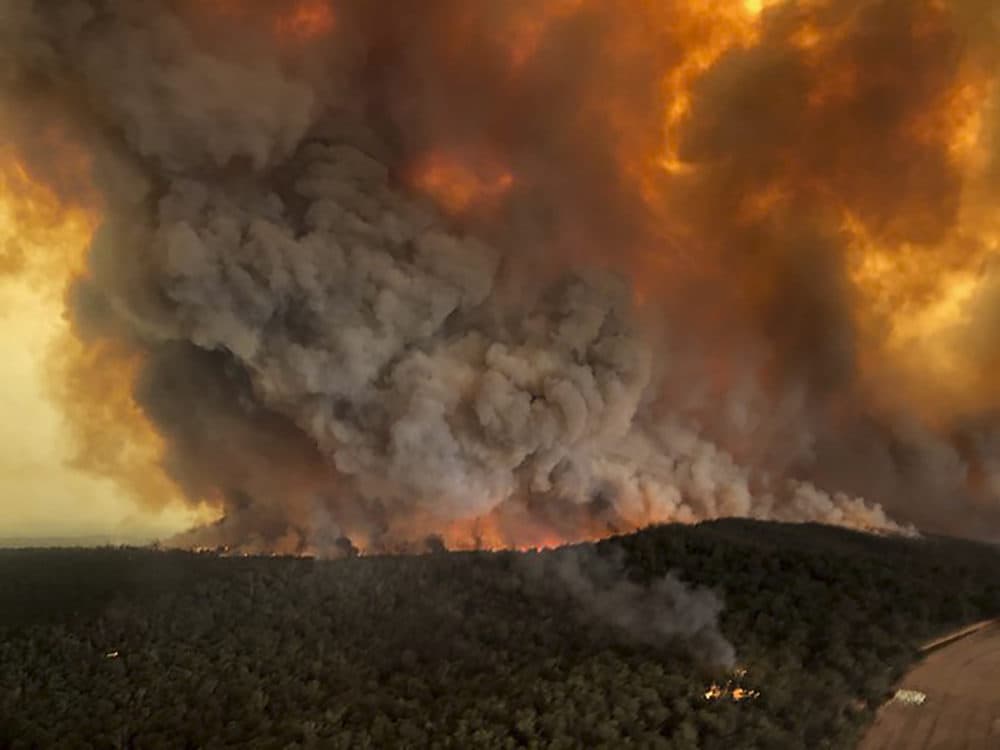Advertisement
Doctor Says Australia Fires Are Impacting Physical, Mental Health
Resume
Doctors in Australia are warning citizens about serious public health effects resulting from the country’s devastating wildfires.
The wildfires have burned millions of acres, killing an estimated billion animals and two dozen people. Dr. Arnagretta Hunter, a cardiologist and member of nonprofit Doctors for the Environment, says the country’s east and south coasts, Sydney and capital city Canberra are seeing the most serious health effects.
It’s common for people who have encountered brushfire smoke to experience effects like sore eyes and a scratchy throat, she says. But doctors have also seen an increase in “irritation and exacerbations of lung disease,” she says.
People with underlying lung and heart diseases, chronic obstructive pulmonary diseases like emphysema, smoking-related lung diseases and asthma have been more likely to visit their doctor or the hospital, Hunter says.
Previous studies show air pollution from wildfires may result in increased mortality over the summer, she says. Plus, Australia is facing one of the hottest summers in the country’s history.
“We have smashed records through December, particularly for the hottest day,” Hunter says. “We know that will also increase mortality and increase hospitalizations, particularly for our vulnerable population of older people with both heart and lung disease.”
Doctors think most Australians will be fine, she says, but they’re not sure whether a healthy person who isn’t hospitalized from smoke exposure will “suffer significant long-term effects.”
Some studies suggest the general population may see a change in lung function and research programs are investigating this possibility further, she says.
As a cardiologist, Hunter says she thinks about how these periods of heat and air pollution have disrupted one way people maintain their health — exercise routines. She also thinks the smoky skies have caused those living underneath it “at least some transient anxiety,” she says.
People feeling concerned about their homes, family and community are common during fires, but she says Australians living through this event are worried about something bigger.
“I think for a lot of people across Australia, we're really considering the impact climate change may have on our lives now and into the future,” she says, “and that has an unsettling effect on a psychological basis.”
Hospitals have seen an increase in people with mental health concerns like anxiety or depression who are struggling to cope with the situation, she says.
One factor contributing to this increase in psychological distress is the reports of “devastating loss of wildlife” because Australians feel “emotionally connected” to the country’s unique ecosystem, she says.
“We're extraordinarily proud of our beautiful country,” she says. “And we see that has been changed through the fire.”
Historically, rain has helped Australia recover from fires — but this year’s minimal rainfall is worsening negative mental health effects, she says.
Australia has been described as “the most climate-vulnerable developed country in the world,” she says. Hunter agrees with this characterization and thinks other countries can learn from what Australia is experiencing.
Now that we know climate change affects human health in a measurable way, people around the world need to take climate change seriously, she says.
“I hope that the world is looking at the fires that we're experiencing — the magnitude of the event — and gives pause to the carbon targets internationally,” she says. “We need to rapidly decarbonize across the world in order to address dangerous global warming and preserving the Australian environment is a really significant motivator, I think, for all of us to act.”
Ashley Locke produced and edited this interview for broadcast with Todd Mundt. Allison Hagan adapted it for the web.
This segment aired on January 9, 2020.

